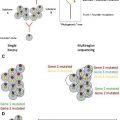With the implementation of genomic technologies into clinical practice, we have examples of the predictive benefit of targeted therapy for oncogene-addicted cancer and identified molecular dependencies in non–small cell lung cancer. The clinical success of tyrosine kinase inhibitors against epidermal growth factor receptor and anaplastic lymphoma kinase activation has shifted treatment emphasize the separation of subsets of lung cancer and genotype-directed therapy. Advances have validated oncogenic driver genes and led to the development of targeted agents. This review highlights treatment options, including clinical trials for ROS1 rearrangement, RET fusions, NTRK1 fusions, MET exon skipping, BRAF mutations, and KRAS mutations.
Key points
- •
With the implementation of genomic technologies into clinical practice, we have examples of the benefit of targeted therapy for oncogene-addicted cancer and identified unique molecular dependencies in non–small cell lung cancer.
- •
The clinical success of tyrosine kinase inhibitors against epidermal growth factor receptor and anaplastic lymphoma kinase activation has shifted treatment to emphasize the genomically defined subsets of lung cancer and genotype-directed therapy.
- •
Continued advances in our understanding of lung cancer biology have validated numerous oncogenic driver genes and have led to the rapid development of targeted agents.
- •
The current available data on ROS1, RET, NTRK, MET, BRAF, and KRAS aberrations in non–small cell lung cancer are presented.
- •
The current state of available trials in this space, mechanism of action of the oncogene, mechanisms of resistance to therapy are presented.
Stay updated, free articles. Join our Telegram channel

Full access? Get Clinical Tree




